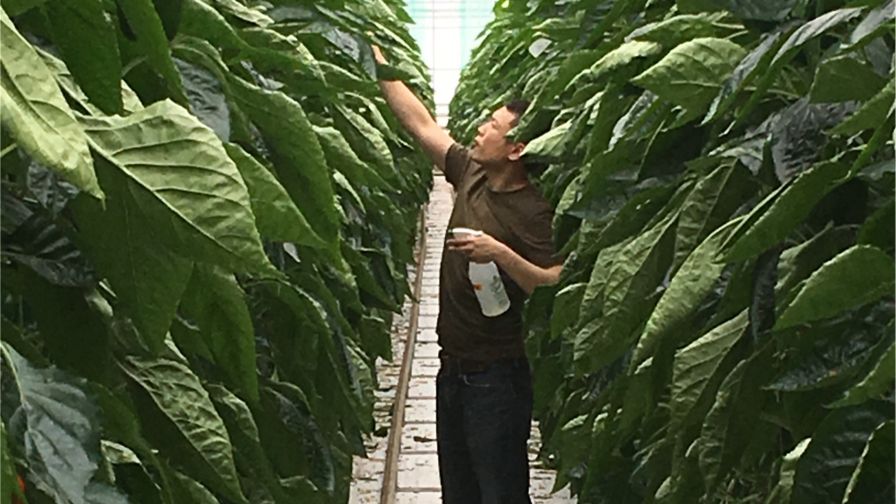AmericanHort Outlines How Businesses Can Navigate COVID-19

Illustration of the coronavirus (COVID-19) courtesy of the Centers for Disease Control and Prevention.
AmericanHort is working hard to help all businesses involved in horticulture, including greenhouse growers, retailers, nurseries, and others, deal with the fallout of the coronavirus (COVID-19). On Monday, March 23, the organization hosted a webinar that focused on how federal, state, and local governments are getting involved in protecting businesses, as well as the economic implications of COVID-19 on the horticulture industry.
“In a time like this, community has never been so important, and fortunately, our industry does this very well,” said Craig Regelbrugge, Senior Vice President of Public Policy and Government Regulations at AmericanHort, in kicking off the webinar.
Along with some of its partners throughout the industry, AmericanHort is focused on business best practices for navigating through the COVID-19 crisis, including how to deal with temporary closures and supply chain disruptions; economic relief for small businesses; and the status of worker visa programs.
Within each of these areas, Regelbrugge points out that while federal guidance has largely included food and agriculture as critical to the nation’s infrastructure (individual sectors have not been specified), the ultimate authority on what is considered an essential business lies with state and local officials.
Here are a few other takeaways from Regelbrugge’s presentation:
- The Family First Coronavirus Response Act, which was signed into law on March 18, expands job-protected leave for workers, while providing tax credits for businesses to cover these costs.
- The status of workers at growing operations varies widely, with some businesses worried about not getting enough workers, and others worried that the workers they are bringing in will not have anything to do.
- Each country’s situation is also different. For example, in Mexico, license processing for H-2A and H-2B workers is continuing, even with some restrictions on border crossing.
- Above all, Regelbrugge notes that businesses need to put the health of their employees first. “This crisis could not be more ill-timed for an industry like ours that works in such a tight window, so we are working to make sure lawmakers act quickly to provide the necessary resources to businesses and their employees.”
Following Regelbrugge’s presentation, Charlie Hall, AmericanHort’s chief economist and Professor and Ellison Chair in the Department of Horticultural Sciences, offered an economic forecast. Hall noted that as consumers cut back on expenses such as gas, eating out, and traveling while they are home-bound, they should naturally have extra income to spend (assuming they are still earning an income).
“The question is whether Lawn and Garden is a category they will choose to spend in,” said Hall, who also noted that businesses are facing the decision to even remain open.
Some say you might be doing a disservice by staying open, and perhaps it’s necessary for more businesses to temporarily close their doors to stop the spread of COVID-19.
The take-home right now is that no one knows how long the current economic downturn will last, and until COVID-19 is under control, it will be difficult to tell what the economy is doing with any certainty.
However, growers can expect and plan for the following, according to Hall, who encouraged businesses to get their contingency plans in place, if they have not already done so:
- Expect clusters of illness among your team
- Identify susceptible critical functions
- Identify supply chain risks
Additionally, Hall said growers can document the impacts of COVID-19 on their businesses, defer major financial decisions until more data come in, build flexibility (labor suppliers, delivery), and watch for growth opportunities.
The complete AmericanHort webinar can be viewed on demand at AmericanHort’s Coronavirus Resource Center. Note: Be sure to download the slide deck and use it to follow along during the webinar, as there were some sound issues during the recording.
Next Webinar is on March 25
The knowledge sharing continues, as AmericanHort has announced another webinar on “The Families First Coronavirus Response Act: Answering Tax and Labor Questions” to take place on Wednesday, March 25, at 1:00 p.m. ET
The webinar will provide an informational update about recent legislation Congress passed in response to the coronavirus emergency and its effects on labor and tax policies from two of AmericanHort’s expert partners — CJ Lake and K-Coe Isom.
Chris Schulte from CJ Lake LLC, a highly respected policy and advocacy firm nationally recognized for its expertise and accomplishments in agricultural and horticultural employment law, will discuss the emergency and sick leave obligations employers face.
Brian Kuehl, Partner and Head of Legislative Affairs, and Beth Swanson, JD and member of the tax legal team from K-Coe Isom, a leading food and agriculture consulting and accounting firm, will provide insights on tax related provisions in COVID-19 related legislation, along with federal filing date changes.
This webinar is designed for anyone with human resource and financial responsibilities within the green industry.
Sign up for the webinar here.









